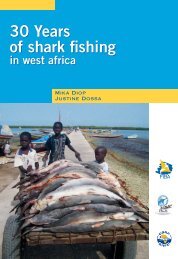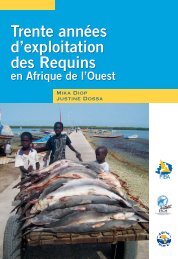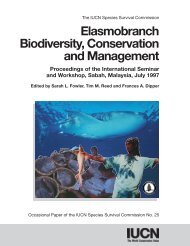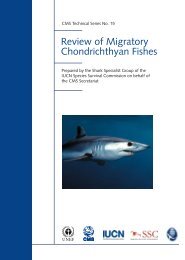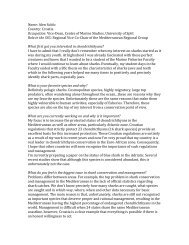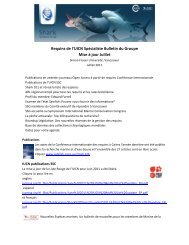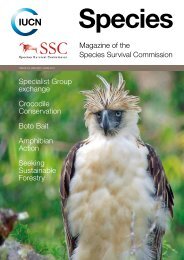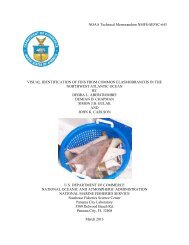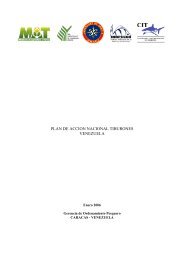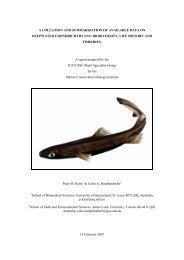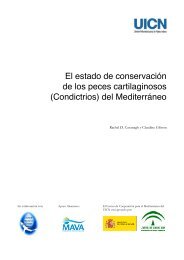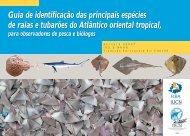Magazine of the species survival Commission specialist Group - IUCN
Magazine of the species survival Commission specialist Group - IUCN
Magazine of the species survival Commission specialist Group - IUCN
Create successful ePaper yourself
Turn your PDF publications into a flip-book with our unique Google optimized e-Paper software.
editorial<br />
continent’s poorest people. The livelihoods <strong>of</strong> an<br />
estimated 7.5 million people in sub-Saharan Africa<br />
depend on inland fisheries. These new data on <strong>the</strong> <strong>IUCN</strong><br />
Red List will be invaluable in helping to safeguard <strong>the</strong>se<br />
fisheries, freshwater supplies and many o<strong>the</strong>r associated<br />
resources. Priority areas <strong>of</strong> highly threatened and rangerestricted<br />
African freshwater <strong>species</strong> can now be<br />
identified. For example, in <strong>the</strong> waters <strong>of</strong> <strong>the</strong> crater-lake<br />
Barombi Mbo, in Cameroon, 11 <strong>species</strong> <strong>of</strong> fish are highly<br />
threatened and live a precarious existence, as<br />
deforestation increases <strong>the</strong> risk <strong>of</strong> lake ‘burping’, where<br />
large levels <strong>of</strong> carbon dioxide are released from deep<br />
within <strong>the</strong> lake, suffocating <strong>the</strong> fish. Without management<br />
intervention <strong>the</strong>se <strong>species</strong>, some <strong>of</strong> which are important<br />
food sources, may be lost forever. Fish are clearly<br />
important to people, both as a source <strong>of</strong> food and<br />
income. But o<strong>the</strong>r freshwater <strong>species</strong> such as molluscs,<br />
dragonflies, crabs and aquatic plants also play vital roles<br />
in maintaining functioning wetlands, and <strong>the</strong>se should not<br />
be ignored. In <strong>the</strong> rapids <strong>of</strong> <strong>the</strong> lower reaches <strong>of</strong> <strong>the</strong><br />
Congo River, 11 <strong>species</strong> <strong>of</strong> mollusc, found only within a<br />
100 km stretch <strong>of</strong> water, are highly threatened due to<br />
upstream pollution. Molluscs such as <strong>the</strong>se provide<br />
important functions, including water filtration.<br />
4. O<strong>the</strong>r <strong>IUCN</strong> Red List Updates. The September <strong>IUCN</strong><br />
Red List update was a very large one, and in addition to<br />
<strong>the</strong> African freshwater <strong>species</strong> referred to above, <strong>the</strong><br />
following <strong>species</strong> groups were also added: Eastern<br />
Tropical Pacific Marine Fishes (nearly 900 <strong>species</strong>);<br />
Crayfishes (over 500 assessments done through <strong>the</strong><br />
Sampled Red List Index (SRLI) project being run by <strong>the</strong><br />
Zoological Society <strong>of</strong> London); Mediterranean Dragonflies<br />
(16 endemic <strong>species</strong>); all <strong>species</strong> <strong>of</strong> Cycad (over 300<br />
<strong>species</strong>, mostly reassessments); all <strong>species</strong> <strong>of</strong> Seagrasses<br />
(about 70 <strong>species</strong>); South African Amphibians (20<br />
endemic <strong>species</strong> reassessed); and New Caledonian<br />
Conifers (38 <strong>species</strong> reassessed). All <strong>the</strong>se changes<br />
brought <strong>the</strong> number <strong>of</strong> <strong>species</strong> in <strong>the</strong> <strong>IUCN</strong> Red List up to<br />
52,017. A fur<strong>the</strong>r major update is taking place in October<br />
2010, including: New Caledonian Plants (in addition to <strong>the</strong><br />
conifers mentioned above); Eastern Himalayan<br />
Dragonflies; Eastern Himalayan Molluscs; Eastern<br />
Himalayan Freshwater Fishes; Angelfishes; Butterflyfishes;<br />
Marine Fishes and Reptiles from <strong>the</strong> Sampled Red List<br />
Index project; European Freshwater Fishes; European<br />
Freshwater Molluscs; and major updates to <strong>the</strong> Mammals<br />
and Amphibians. Certainly, <strong>the</strong> <strong>IUCN</strong> Red List will have<br />
been massively updated and augmented by <strong>the</strong> end <strong>of</strong><br />
<strong>the</strong> International Year <strong>of</strong> Biodiversity.<br />
5. Amphibian Survival Alliance (ASA). The first meeting<br />
<strong>of</strong> <strong>the</strong> interim board <strong>of</strong> <strong>the</strong> Amphibian Survival Alliance<br />
took place in London in August 2010. Simon is most<br />
grateful to Mark Stanley Price for stepping in to chair it<br />
while he was on holiday. The meeting decided to move<br />
ahead with <strong>the</strong> recruitment <strong>of</strong> <strong>the</strong> ASA Executive Director,<br />
and in our next Message, we look forward to announcing<br />
<strong>the</strong> successful candidate. We also expect to be in a<br />
position to hire additional staff during 2011. The<br />
recruitment <strong>of</strong> staff has been made possible by generous<br />
donations from Chester Zoo, Conservation International,<br />
Detroit Zoological Society, Frankfurt Zoo, Frankfurt<br />
Zoological Society, Wildlife Conservation Society, <strong>the</strong><br />
Zoological Society <strong>of</strong> London, and from former SSC Chair<br />
George Rabb. We would like to express our thanks for<br />
this extremely generous support. The staff will almost<br />
certainly be based in <strong>the</strong> <strong>of</strong>fices <strong>of</strong> <strong>the</strong> Zoological Society<br />
<strong>of</strong> London.<br />
6. SSC Specialist <strong>Group</strong>s. We are sorry to announce that<br />
Alain Crivelli has stepped down after many years as Chair<br />
<strong>of</strong> <strong>the</strong> Pelican Specialist <strong>Group</strong>, shared with Wetlands<br />
International. He has been replaced by Giorgos<br />
Catsadorakis. Brooks Childress has also stepped down<br />
after several very successful years as Chair <strong>of</strong> <strong>the</strong><br />
Flamingo Specialist <strong>Group</strong>, and has been replaced by<br />
Rebecca Lee. And finally, Vincent Kalkman has handed<br />
over <strong>the</strong> reins <strong>of</strong> <strong>the</strong> Dragonfly Specialist <strong>Group</strong>, at least<br />
on an interim basis, to <strong>the</strong> former Chair, Viola Clausnitzer.<br />
We thank Alain, Brooks and Vincent for <strong>the</strong>ir dedicated<br />
work on behalf <strong>of</strong> <strong>the</strong> SSC and for conservation in<br />
general, and hope that <strong>the</strong>y will continue as active<br />
members <strong>of</strong> <strong>the</strong> <strong>Commission</strong>. Also, we welcome Giorgos,<br />
Rebecca and Viola to <strong>the</strong>ir new and important<br />
responsibilities. We are also pleased to announce that,<br />
after many years, <strong>the</strong> SSC Butterfly Specialist <strong>Group</strong> has<br />
been re-established, and we welcome <strong>the</strong> new Chair,<br />
Scott H<strong>of</strong>fman Black.<br />
As always, what we have left out <strong>of</strong> this Message is much<br />
more than what we have included. There have, <strong>of</strong> course,<br />
been a very large number <strong>of</strong> important activities carried out<br />
among <strong>the</strong> SSC Specialist <strong>Group</strong>s and Sub-Committees,<br />
and in <strong>the</strong> Species Programme – far more than we have<br />
space for here. Some <strong>of</strong> this news is reported on elsewhere<br />
in this issue <strong>of</strong> Species. We continue to be humbled by <strong>the</strong><br />
dedication that all <strong>of</strong> you demonstrate, both in <strong>the</strong> SSC and<br />
on <strong>the</strong> staff, for <strong>the</strong> conservation and recovery <strong>of</strong> <strong>the</strong> world’s<br />
<strong>species</strong>. From both <strong>of</strong> us, thank you very much.<br />
Simon Stuart<br />
Chair, <strong>IUCN</strong> Species Survival <strong>Commission</strong><br />
Jane Smart<br />
Head, <strong>IUCN</strong> Species Programme<br />
Director, Biodiversity Conservation <strong>Group</strong><br />
4 • <strong>species</strong> 52




